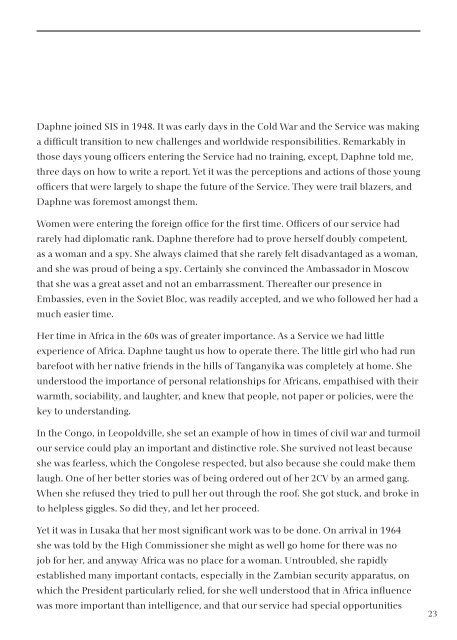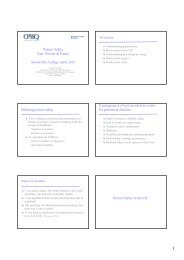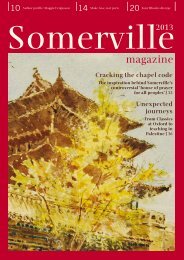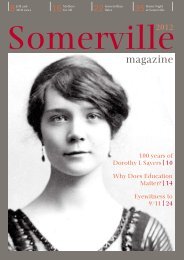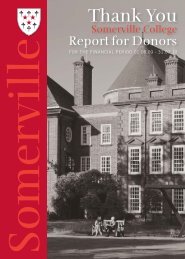The Secret Intelligence Service<strong>Memorial</strong> Address by Sir Gerald Warner, University Church,Oxford, 29 May 2010DAPHNE PARK WAS A REMARKABLE LADY: soldier, intelligence officer,Principal of <strong>Somerville</strong> <strong>College</strong>, and Baroness <strong>Park</strong> of Monmouth. A legend in herown lifetime, yet what was most remarkable was her simple goodness, and the almostuniversal affection and esteem in which she was held. I am here to remember her asan old friend and colleague in the Secret Intelligence Service.<strong>Daphne</strong> was a child of Empire. Love of our country, its history and traditions, whatshe therefore believed we should stand for as a people and as individuals, were whatshaped and drove her life. Her virtues were old fashioned, rooted in a quiet Anglicanfaith: honesty, unselfishness, compassion. They were the bedrock of her personality,and gave it its integrity and strength. Allied to her courage, energy and optimism, theymade her the formidably effective, enchanting person we knew.She was equipped for many callings. Long ago I asked her why she chose the Service.“Oh, John Buchan, you know. When I was very young I read to my Mother. He was ourfavourite author, Richard Hannay was my hero” There are a lot of echoes of Hannay in<strong>Daphne</strong>, yet I suspect that this was only part of the story. She always marched towardsthe sound of the guns.She was fearless in the face of hierarchy, honest whatever the possible cost to herself.Going down from <strong>Somerville</strong> in 1940, she served in the Special Operations Executive,and loved it. Yet on one notable occasion she put her career at risk. In 1943 she wasposted a very special operational command, the Jedburghs, to train officers and agentswho would drop into Europe on D Day in the communications and cipher skills vitalto their security. She became convinced that her boss was not up to the job, and thatthe operation was at risk. Only a young other rank, she asked to see the commandingofficer, Colonel Buckmaster, and told him the officer should be moved. He heard herout, and the officer was replaced. Buckmaster then wanted to give her a commission,which had to be cleared with the FANY, her parent organization. They called herin and told her she had committed a serious breach of discipline which they wereprepared to overlook, provided she undertook never to do the same again. <strong>Daphne</strong>’sinstant response was that that was impossible. Of course she would do it again if it wasnecessary. And of course she won. She was commissioned.22
<strong>Daphne</strong> joined SIS in 1948. It was early days in the Cold War and the Service was makinga difficult transition to new challenges and worldwide responsibilities. Remarkably inthose days young officers entering the Service had no training, except, <strong>Daphne</strong> told me,three days on how to write a report. Yet it was the perceptions and actions of those youngofficers that were largely to shape the future of the Service. They were trail blazers, and<strong>Daphne</strong> was foremost amongst them.Women were entering the foreign office for the first time. Officers of our service hadrarely had diplomatic rank. <strong>Daphne</strong> therefore had to prove herself doubly competent,as a woman and a spy. She always claimed that she rarely felt disadvantaged as a woman,and she was proud of being a spy. Certainly she convinced the Ambassador in Moscowthat she was a great asset and not an embarrassment. Thereafter our presence inEmbassies, even in the Soviet Bloc, was readily accepted, and we who followed her had amuch easier time.Her time in Africa in the 60s was of greater importance. As a Service we had littleexperience of Africa. <strong>Daphne</strong> taught us how to operate there. The little girl who had runbarefoot with her native friends in the hills of Tanganyika was completely at home. Sheunderstood the importance of personal relationships for Africans, empathised with theirwarmth, sociability, and laughter, and knew that people, not paper or policies, were thekey to understanding.In the Congo, in Leopoldville, she set an example of how in times of civil war and turmoilour service could play an important and distinctive role. She survived not least becauseshe was fearless, which the Congolese respected, but also because she could make themlaugh. One of her better stories was of being ordered out of her 2CV by an armed gang.When she refused they tried to pull her out through the roof. She got stuck, and broke into helpless giggles. So did they, and let her proceed.Yet it was in Lusaka that her most significant work was to be done. On arrival in 1964she was told by the High Commissioner she might as well go home for there was nojob for her, and anyway Africa was no place for a woman. Untroubled, she rapidlyestablished many important contacts, especially in the Zambian security apparatus, onwhich the President particularly relied, for she well understood that in Africa influencewas more important than intelligence, and that our service had special opportunities23
- Page 1: Daphne Park1921-2010MEMORIALTRIBUTE
- Page 4 and 5: ContentsForeword by Dr Alice Procha
- Page 6 and 7: Address given by Miss Barbara Harve
- Page 8 and 9: ecame, the servant of a country tha
- Page 10 and 11: Nevertheless, these stories are maj
- Page 12 and 13: Conservative policies. Having recei
- Page 14 and 15: ifle. Nevertheless, his young wife
- Page 17 and 18: SchoolIN HER OWN WORDS:I LOVED SCHO
- Page 19 and 20: presented the play, I duly delivere
- Page 21: War ServiceFrom the Profile of Daph
- Page 26 and 27: to exercise it. Nevertheless much s
- Page 28 and 29: say, as a conservative cross benche
- Page 30 and 31: Daphne, this moral dimension of hum
- Page 32 and 33: The following accounts of some of D
- Page 34 and 35: On June 30, 1960, independence was
- Page 36 and 37: that there would be a lot of armed
- Page 38 and 39: it. Weevils and worms used to come
- Page 40 and 41: leave, and the Mongols would supply
- Page 43 and 44: thought, slightly amused Miss Marpl
- Page 45 and 46: one or the other type, millionaires
- Page 47 and 48: she gave to the New Yorker in 1989,
- Page 49 and 50: Even better, of course, was really
- Page 51: Wolfson during the afternoon with a
- Page 54 and 55: DAPHNE WAS THE PRINCIPAL OF THE COL
- Page 57 and 58: Member of the Sheffield Development
- Page 60: Somerville CollegeOxford OX2 6HDTel


